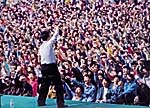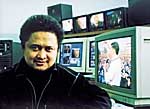Award-winning independent director Zhang Yuan
explores sensitive social topics -- but now with official approval.



"Crazy English! Crazy life! Crazy world!" shouts the
man with the microphone, flailing his arms. "I love this crazy game,
so let's go!" A camera crew follows the madman down the snow-covered
street. Breathing white vapor into the faces of the close-pressed crowd
members, he mobilizes the entourage into shouting in unison in English:
"Crazy! Crazy! Crazy!" Then the sound technician, backpedalling quickly
to keep up with the camera, trips and falls into a muddy puddle of melted
snow.
So begins Crazy English, the first
documentary
by acclaimed filmmaker Zhang Yuan to receive official approval.
"I'm competing for an Oscar with this film!" exclaims
Zhang, who can barely conceal his excitement about being finally allowed
to make films legally in China.
The veteran director does not need an Oscar to
vindicate
himself, having garnered over 30 major international awards in
the past
decade with critically-acclaimed films such as Beijing
Bastards,
East Palace West Palace and his recently completed Home
For
The Holidays which premiered at the Venice Film Festival. He was
recently selected by Time magazine as one of the top 100
"people
to watch" in the coming century.
However, Zhang is little known in China. Since his
debut documentary film Mama, about a single mother raising a
retarded child in Beijing, every one of Zhang's five major films has
been made without government permission. Although the 36 year-old director
has entered these works in numerous international film festivals (again
without official approval), none of them has been approved for screening
in China. While enjoying fame abroad, Zhang╝s real desire is for his
works to be seen by Chinese audiences.
His dream may soon come true. His latest
effort, Crazy
English, will be released nationwide next month, and Home For
the Holidays has received preliminary government approval.
By Chinese standards, Zhang is a highly unorthodox
filmmaker, both in choice of content and in technique. He
specializes
in sensitive social topics, such as autistic children (Mama),
underground artists (Beijing Bastards), alcoholism and
dysfunctional
family dynamics (Sons), homosexuality (East Palace,
West Palace)
and prison life (Home For the Holidays).
Zhang's films can be painfully honest to watch and
all his features are filmed on location, instead of on constructed sets,
with the exception of East Palace, West Palace, his first and
only conventionally-filmed feature. Zhang's documentaries have no voice-overs.
He almost never uses musical soundtracks to highlight dramatic moments.
Abandoning such narrative devices, although not unusual in the West,
is at odds with the conventions of the staid Chinese film industry.
Traversing China with Li Yang, creator of the "Crazy
English" method of learning English by shouting, Zhang Yuan's new documentary
faithfully records mass gatherings where Li turns studying English into
an act of patriotism and thousands of naturally shy Chinese into hollering
maniacs. Li lectures his crowds ranging from PLA soldiers atop the Great
Wall to uniformed high school students in the mountainous backwaters
of Hubei that fluent English is the key to seizing the markets of Japan,
Europe and the U.S., making lots of money and bolstering Chinese national
pride. He never hesitates to make fun of foreigners aloud, including
his American sidekick, who does not understand Chinese and serves as
a straight-man stooge for Li.
In the film, Li tells his story over and over again
in interviews, on radio, on television and in commercials how he turned
from a shy boy too scared to even answer the telephone to a successful
businessman after discovering a unique means of achieving self-assurance
through speaking perfect English.This involved shouting it first.
Li also teaches people to yell out his motto:
"I love
humiliation! I embrace hardship! I welcome failure! I pursue
success!"
Zhang has shown the film's first rough-cut to friends
and colleagues. Some say Li is a fraud and should be stopped immediately
from conning money out of innocent people. Others excitedly ask Zhang
where they can purchase Li's textbook.
"People's reactions have been mixed and varied after
watching this film," Zhang observes. "But my own attitude must be neutral.
This film would be worthless if I showed even a tiny trace of subjective
judgement."
Zhang regards himself as a documentary
reporter, who
must stay objective and let the story tell itself. "I try to abandon
any subjective views as an artist," he says. "I often forget that I
am making a film and focus all my attention on how to accurately
portray
what has provoked my interest." Although a painter by training, and
a cinematography graduate from the prestigious Beijing Film Academy,
Zhang is sparing in the application of artistic flourishes and fancy
camera techniques. He is sometimes too timid to move his camera,
lest
he miss any intricate changes in the expressions of his actors.
"I rarely
think about how I should show off my techniques in lighting, camera
movements and editing," he explains. "For me, the content is much
more
important than the style."
Zhang's eye for detail and artistic interpretation
found perfect unison in his 1995 documentary-drama Sons, about an alcoholic
father, his wife and their two sons. The Li family of four volunteered
to relive, on screen, their saga of drinking, fighting, abuse, injuries,
and sexual confusion. "During shooting, the actors often forgot that
I was filming and became completely absorbed in their own emotions,"
recounts Zhang. "I had to stop filming and pull them apart a few times."
The production allowed Zhang Yuan to film inside a
mental asylum for the first time in China. Apart from taking the top
prize at the Rotterdam Film Festival, the work also served as family
therapy and brought the alienated members of the Li family closer
together.
A native of the ancient capital city of
Nanjing, Zhang
spent the first eight years of his childhood with his
grandmother, before
returning to his political pariah parents when he was nine following
the (1966-76) Cultural Revolution. He then left home again at 16 for
school, and settled in Beijing at 20. This experience has made
him especially
sensitive to family relationships, the topic of three of his five
features.
When he talks about Sons, Zhang cannot help envying the Li
family.
"Despite fighting like cats and dogs, they remain loyal to each
other,"
he says.
"During the three months of shooting, they continually
discussed the concept of love which is extremely rare for Chinese families,"
Zhang adds.
Indeed, Chinese people are not known for expressing
their feelings outwardly, especially among family members. This is a
major theme of Zhang's new feature, Home For the Holidays, about
the parole home visit of a woman who has spent 17 years in prison for
killing her stepsister. Official approval for the production also allowed
Zhang to film inside a prison ward, another first in China's red-tape
constricted film industry.
In the film, prison warden Xu takes Liu Li, the parolee,
home to her mother and stepfather (whose daughter Liu Li murdered) for
the traditional Chinese New Year family reunion. Xu and the camera then
become eyewitnesses to the subtle emotional exchanges between the three
family members their love for one another expressed in a repressed and
reserved manner; Liu Li's remorse; her mother's anxiety and fear; her
stepfather's silent struggle to rise above his pain; and ultimately,
their determination to continue their lives, happily and peacefully,
as a family.
There is no great drama. There are no
passionate speeches
or shouting, no trashing of furniture or pulling of hair, no
rage, and
no tears. But as Xu is touched on screen, the viewers are touched
off
screen, by a film that bears the unmistakable mark of Zhang Yuan. A
film in which ordinary people and their ordinary lives evoke
extraordinary
emotions.